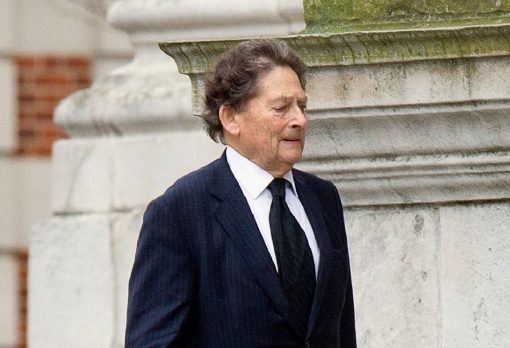Lord Lawson would command the admiration and gratitude of the sceptic cause when he raised the economics of climate change in the House of Lords. DeSmog UK’s epic history series continues.
Lord Nigel Lawson delivered the coup de grâce in June 2005 when he persuaded his fellow peers on the economic affairs committee of the House of Lords to examine the economics of climate change.
As a committee member, Lawson persuaded the House of Lords to launch a powerful and high profile Parliamentary inquiry examining allegations that the UN’s Intergovernmental Panel on Climate Change (IPCC) had based its analysis on poor statistics and economics.
Disposed to Scepticism
The committee would be guided by the eminent and almost universally revered professor David Pearce, emeritus professor of economics at University College London, who had previously advised the IPCC but retained some concerns about the scientific consensus on climate change.
“Most of its members held generally to the ‘consensus’ view” observed the sceptic Sunday Telegraph commentator Christopher Booker. “But one or two, including Lord Lawson of Blaby… were disposed to ‘scepticism’.”
The committee’s decision to question the objectivity of the IPCC stemmed from allegations first raised by former chief economist at the Organisation for Economic Co-Operation and Development (OECD), David Henderson.
As Richard North of the Institute of Economic Affairs (IEA) noted: “This summer [Henderson] … seems to have scored a considerable success in persuading the House of Lords’ economic affairs committee that it was time for some hard thinking about the cost effectiveness of different options for dealing with climate change.”
Christmas for Sceptics
The hearing was like Christmas come early to the sceptics and almost all arrived under Lawson’s bright star to deliver their various scientific claims and criticisms of the IPCC carefully gift wrapped in academic-sounding reports and official-seeming memorandum.
For example, Julian Morris – director of Antony Fisher’s free market think tank, the International Policy Network (IPN) – submitted evidence as a professor at Buckingham University, the free market higher education establishment set up decades earlier by the IEA with Thatcher’s tacit support.
“Climatic change may turn out to be benign or harmful: we do not know. But in the context of this uncertainty, policies that are narrowly focused on adaptation to possible negative effects are short-sighted and may even be counterproductive,” argued the private sector professor.
“Policies aimed at mitigation through control of atmospheric carbon are almost certainly counterproductive.”
Climate denier Dr Fred Singer also gave evidence and in the process struck up a close collaboration with Lawson that would continue long after the inquiry had closed.
“I know him personally, on a first-name basis,” Singer told me. “I talked to him about the science, because he is not particularly experienced, and he absorbed all of this because he is a man of great intelligence and understands things when they are explained.”
Asked when they first corresponded, he added: “It was his involvement in the parliamentary committee. He asked for some comments and I sent him some comments.”
‘Positive Aspects’
The select committee published its report, The Economics of Climate Change, in July 2005. The publication coincided with then-Prime Minister Tony Blair’s presidency of the G8 conference in Gleneagles, Scotland, which he was using to put climate change at the top of the international political agenda.
The report echoed the sceptic cry that there are “positive aspects to global warming” and amplified their claim that “the science of human-induced warming remains uncertain”.
It cited a mismatch between the economic costs and benefits of climate policy as well as criticised the greenhouse gas emission reduction targets set by the Kyoto Protocol adopted in 1997.
The select group of peers argued that the IPCC was compromised because the UN was
“influenced by political considerations” and repeated the suggestion that Kyoto “will make little difference to future rates of warming.” The British government must therefore press the IPCC to reform its whole approach, the report concluded.
In response to the committee’s report, Michael Grubb, chief economist of the Carbon Trust wrote an article in Prospect Magazine which described the report as being “strikingly inconsistent”.
Lawson however steadfastly defended the report’s conclusions. Morris too, was particularly pleased with the results.
In his end of year accounts he gloated that IPN “staff made submissions to an inquiry into the economics of climate change by the House of Lords Economic Affairs Committee.”
That same year the IPN’s US branch started receiving $50,000 a year in funding from the ultra-conservative free market Sarah Scaife Foundation. The Foundation is also known for funding the Heartland Institute’s annual climate change conference as well as Fred Smith’s anti-climate think tank, the Competitive Enterprise Institute.
The sceptic bandwagon in Britain was now beginning to role and with Lawson’s weight behind them it picked up an almost unstoppable momentum.
The next DeSmog UK epic history post follows Lawson as he travels to the United States to brief a Senate committee on the parliamentary inquiry into the economics of climate change.
Photo: The Independent via Creative Commons
Subscribe to our newsletter
Stay up to date with DeSmog news and alerts






